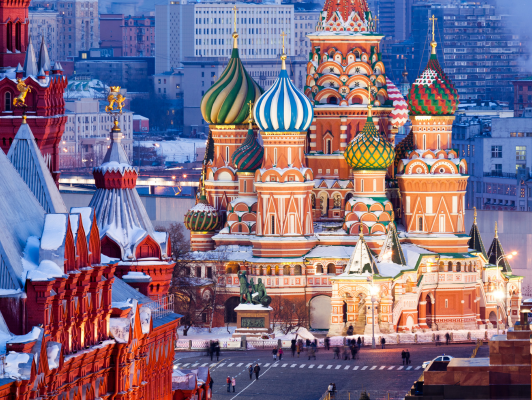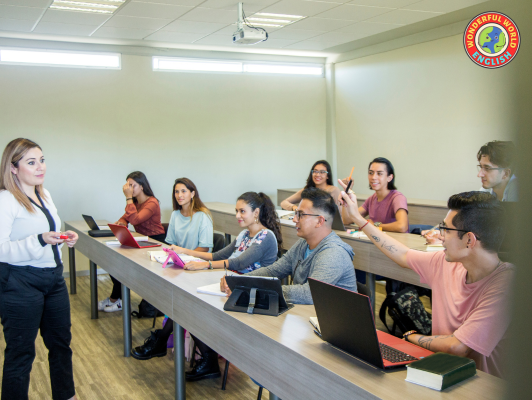Contents
Toggle
Meet David De’ Ath, founder, editor, and writer at Wonderful World English. With his extensive background as an English teacher, David provides valuable insights and practical tips on ESL for students and teachers alike.
Teaching English in Russia presents a valuable opportunity for educators seeking an international experience.
Russia’s demand for English language education means teachers can often find positions in various educational settings, from private language schools to public institutions.
With English included in the public school curriculum, there’s a consistent need for English teachers.
Russia offers an appealing mix of modern cities rich with history and culture, which can be an alluring backdrop for teaching and living.
Securing a teaching position typically requires a TEFL certificate, and while a four-year college degree is not a necessity, it is often preferred.
Teachers must recognize the various work environments and contractual conditions and understand the financial aspects associated with teaching in Russia.
Key Takeaways
- Teaching English in Russia can provide educators with diverse opportunities in multiple educational settings.
- Qualifications for teaching positions usually include a TEFL certificate, with a preference for a four-year college degree.
- Prospective teachers should be aware of the financial, contractual, and lifestyle aspects of teaching and living in Russia.

Russian Market for English Teachers
The Russian market for English teachers is shaped by an increasing demand in educational settings amid a rich cultural backdrop.
Seeking to bridge communication in international trade and relations, Russia presents diverse opportunities for educators.
Demand for English Teachers in Russia
The demand for English teachers in Russia is robust due to the country’s global position and expanding economy.
The need for skilled English teachers is especially high in major cities and regions, particularly in Moscow and St. Petersburg.
English proficiency is regarded as vital for many Russians seeking career advancement, and this fuels the need for language educators.
Preferred Locations for Teaching
Regarding preferred teaching locations, major cities in Eastern Europe, such as Moscow, the capital of Russia, and St. Petersburg, are top of the list.
However, there’s also interest in English education in smaller cities and rural areas, where opportunities might include more competitive salaries and lower living costs.
Understanding Russian Culture and Language
For English teachers in Russia, comprehending the local culture and language is crucial.
While the market is accessible, navigating it successfully involves an appreciation for Russia as the largest country in the world, with a diverse population and rich history.
Familiarity with the basic Russian language can be invaluable for day-to-day interactions and classroom management.

Basic Requirements and Qualifications
Prospective educators should be aware of Russia’s emphasis on certain educational credentials and teaching qualifications to secure a teaching position.
Familiarity with the culture and language is also highly advantageous.
Educational Background
Most schools in Russia prefer candidates to possess a university degree, with a bachelor’s degree being the minimum requirement.
The subject of the degree is often secondary to the fact that the individual has completed higher education, although degrees in Education or English may provide a competitive edge.
TEFL Certification and Teaching Experience
A TEFL certification is generally necessary for teaching English in Russia, with a 120-hour course considered standard.
Prior teaching experience is not always a requirement but can significantly enhance job prospects and the possibility of higher compensation.
Some employers may also recognize a TESOL certification as equivalent to TEFL.
Language and Cultural Sensitivity
While not always mandated, being a native English speaker is typically expected for teaching roles in Russia.
Additionally, understanding Russian culture and basic language skills can be beneficial, though not compulsory.
This adaptability and cultural sensitivity to the host country can facilitate a more effective teaching environment and smoother integration into the community.
Click the link below to claim (at least) 30% off your TEFL certificate today!

Securing a Teaching Position
When looking to teach English in Russia, candidates must navigate through a job market with a mix of public and private schools, understand the nuances of the interview process, and ensure all visa and legal documentation meet Russia’s requirements.
Finding a Job
Jobs teaching English in Russia are available in both public schools and private language institutions.
Candidates are encouraged to search for positions online, utilize specialized job boards, and contact schools directly.
It’s essential to start the job search well before the intended start date, as this process can take several months.
- Job Boards: Websites like ESL Authority and TEFL Org provide listings specific to teaching in Russia.
- Direct Contact: Candidates can also reach out directly to schools to inquire about openings.
The Interview Process
The interview process for teaching positions often involves several stages, which may include initial screenings, one-on-one interviews, and sometimes demonstration lessons.
- Screenings: These preliminary checks ensure the candidate’s qualifications and language proficiency.
- Interviews: Interview questions typically cover educational background, teaching experience, and adaptability to life in Russia.
Visa and Legal Documentation
To work legally in Russia, educators must obtain a work visa sponsored by the hiring school. The process includes:
- Invitation Letter: Provided by the employer for visa application.
- Visa Application: Submission of documents to the Russian consulate or embassy.
- Legalization of Documents: Including diplomas and certifications, which may need apostilles or official translations.
Candidates must ensure they meet all the legal requirements before arriving in Russia, including any updates to visa legislation.

Financial Aspects of Teaching in Russia
The financial components of teaching English in Russia range from salary expectations to the cost of living and budgeting effectively for day-to-day expenses.
Salary Expectations
Teachers in Russia can anticipate a monthly income from $1,000 to $2,000, largely depending on their qualifications and workplace.
For instance, those instructing at higher-end institutions, such as universities or international schools, tend to secure a higher salary bracket, crossing the $1,500 threshold, while language schools usually offer paychecks within the range of 70,000 – 100,000 rubles (approximately $1,000 – $1,300 USD).
Although teachers in Russia can expect to earn a good living, there are other countries where ESL teachers can save more
For a list of the most AFFORDABLE countries in the world for ESL teachers, check out the link below!
Related: 7 Most AFFORDABLE Countries for Teaching English Abroad
Cost of Living and Accommodation
The cost of living in Russia is relatively affordable compared to many Western countries.
Accommodation generally constitutes a substantial part of an expatriate’s budget.
Renting a one-bedroom apartment in the city center averages about 35,000 rubles per month, whereas living outside the center can reduce that cost by nearly half.
Including utilities, the monthly accommodation expenses can reach up to 45,000 rubles, depending on the location and size of the housing.
Budgeting for Daily Expenses
Effective budgeting must take into account groceries and daily expenses, including transportation and occasional leisure activities like enjoying a cappuccino in the local café.
| Expense Category | Average Cost (Rubles) | Average Cost (USD) |
|---|---|---|
| Groceries | 12,000 – 15,000 | $160 – $200 |
| Utilities (monthly) | 4,000 – 6,000 | $55 – $80 |
| Cappuccino | 150 – 250 | $2 – $3.50 |
| Transportation (monthly pass) | 2,000 | $27 |
In sum, given these figures, teachers can manage a comfortable lifestyle by tracking their monthly expenses and aligning them with their paychecks.

Work Environments and Contracts
In Russia, English teaching positions vary widely across different types of educational institutions, each offering unique environments and contract stipulations.
Prospective teachers should weigh contract terms, including benefits and obligations, against the specific work setting to make an informed decision.
Types of Schools
Public Schools: Often have full-time contracts, but may pay less than private institutions. English teachers may work alongside Russian teachers and follow a standard curriculum.
Private Language Schools: These schools offer more competitive salaries and often provide free accommodation for their teachers. They cater to a range of learners, from children to business professionals, and typically have smaller class sizes.
International Schools: These are prestigious establishments offering instruction in English. They require experienced teachers and typically pay higher salaries. The contracts at international schools are comprehensive with substantial benefits.
Language Courses at Universities: These positions often offer privileged access to academic resources and can involve teaching more advanced English learners.
Contract Terms and Employee Benefits
Duration and Hours: Contracts typically range from 9 to 12 months, with options to renew. Teaching hours can vary, but a standard full-time load is 20 to 30 hours per week.
Benefits:
- Salaries range widely but are generally competitive.
- Employers may offer health insurance, particularly in private language and international schools.
- Schools sometimes include free accommodation or housing stipends in their benefit packages, lowering the cost of living for the teacher.
- Paid vacation is common, though the exact amount can vary.
- Flight reimbursement can be part of the package, particularly for long-term contracts.
Obligations:
- Compliance with visa and work permit regulations is mandatory.
- Teachers are often required to have at least a 120-hour TEFL certificate and, in some cases, a Bachelor’s degree.
- Adherence to the school’s curriculum and participation in school-related activities may be expected.
By understanding the types of schools available and the terms laid out in teaching contracts, individuals can choose positions that align best with their personal and professional goals.

Life in Russia for English Teachers
Life in Russia for teachers of English has its unique set of experiences, ranging from the cultural diversity of cities like Moscow and St. Petersburg to the challenges of harsh winters.
These aspects shape the life and adaptation of educators in this vast country.
Cultural and Social Life
In Russia, English teachers can immerse themselves in a unique cultural experience enriched by historical landmarks such as the Kremlin and Red Square.
Moscow and St. Petersburg boast a vibrant social scene with numerous cafes, where a cappuccino is emblematic of the country’s embrace of global tastes.
- Moscow: Bustling metropolis with diverse educational opportunities for teaching adults.
- St. Petersburg: Known for its rich history, arts, and culture, providing a stimulating environment for educators.
- Smaller Towns: Offer a more intimate community feel for teachers seeking a quieter lifestyle.
Weather Conditions and Adaptation
Russia’s climate varies greatly, and teachers must be prepared for cold winters, especially when living in places like Yekaterinburg or near Lake Baikal.
Learning to dress in layers and understanding the importance of proper winter attire is crucial for comfort.
- Moscow and St. Petersburg: Experience milder winters compared to Siberia.
- Siberia: Harsh winters with heavy snowfall make the Trans-Siberian Railway a vital means of transportation.
Safety and Health
While Russia offers an exciting opportunity to live abroad, teachers need to be aware of local safety and health considerations.
Larger cities like Moscow exhibit typical urban crime rates, but with standard precautions, they can be safe places to live.
- Accommodation: Usually secure, with support for finding safe and comfortable housing often provided by schools.
- Healthcare: In larger cities like Moscow and St. Petersburg, access to quality healthcare is readily available, whereas in smaller towns, facilities may be more limited.

Career Advancement and Opportunities
In Russia, the landscape of English teaching can afford numerous avenues for career growth and diversification.
Educators often find that, alongside teaching, there are budding prospects for professional development, private sector engagement, and expansive reach through online platforms.
Professional Development
Experienced teachers in Russia may elevate their careers by engaging in continuous professional development.
Opportunities such as workshops, seminars, and additional training, like TEFL certifications, are beneficial.
Teachers who invest in training can learn new methodologies or specialize in areas such as IELTS preparation or business English, enhancing their teaching capabilities and marketability.
Private Tutoring and Business English
Private tutoring emerges as a lucrative option for English teachers, especially for those who have gained substantial experience in Russia.
As a native speaker, one might delve into the niche of Business English, which is in high demand amongst Russian professionals aiming to globalize their operations.
This sector often yields higher pay and flexible hours, appealing to teachers aiming to supplement their income.
Online Teaching and International Opportunities
The magnitude of virtual education has witnessed substantial growth; thereby, opportunities for online teaching are abundant.
Teachers with a solid internet connection can extend their reach far beyond the conventional classroom.
For those seeking international mobility or a means to teach while traveling, online teaching platforms cater to a worldwide audience, presenting a versatile and potentially lucrative avenue for career advancement.
Related: Is Online Teaching a Good Career? – Teacher’s Answer

Considerations for Relocation
When relocating to teach English in Russia, prospective teachers must navigate a range of logistical components, including securing appropriate transportation, understanding visa regulations, and preparing for the linguistic and cultural journey ahead.
Transportation and Local Navigation
When relocating to Russia, one must first consider how they’ll traverse the vast nation.
Russia’s transportation network varies greatly, from the expansive metro system in Moscow to the Trans-Siberian railway that connects distant parts of Eastern Europe.
Teachers should plan their arrival and local commute in advance, ensuring they are familiar with the transport options in their specific location.
Learning to navigate time zones is essential when arranging travel schedules.
- Major Cities: Metro systems are robust and efficient.
- Rural Areas: Bus services are more common; however, schedules can be less reliable.
Familiarizing oneself with basic Russian phrases for directions can become invaluable when using local transport.
Despite the adventure that comes with exploring a new country, efficiently navigating the transportation system is crucial for timely attendance at work and other commitments.
Managing Expectations and Preparations
Once transportation is tackled, it is paramount to ensure that all legal requirements, such as the work visa, are in order. Russia’s government mandates a proper work visa for teaching; securing this involves ample time and accurate documentation.
- Work Visa: Research and apply well ahead of the intended start date.
The Russian language barrier can present a notable challenge.
Educators should invest time in learning the language basics for smoother daily interactions, both inside and outside the classroom.
- Language Skills: Basic proficiency is recommended for ease of communication.
Teachers may choose to live in school-provided accommodations or seek private housing, which can come with a stipend.
Housing arrangements tend to vary widely based on the region and the employing institution.
- Accommodations: Reflect on whether a provided apartment or a personal rental suits your needs best.
Adaptation to local customs and lifestyle holds the key to a fulfilling experience.
Educators should engage with the local community, embrace the unique facets of Russian culture, and approach their new life with an open mindset toward the myriad of learning opportunities that await this Eastern European adventure.

Conclusion
Teaching English in Russia offers educators a unique blend of cultural immersion and professional development.
Potential instructors are drawn by prospects such as experiencing the grandeur of the Kremlin or the Siberian wilderness.
They should, however, be prepared for the realities of the job.
Key Points to Consider:
- A 120-hour TEFL certificate is typically required to secure a teaching position.
- Positions may include teaching business English, which is often held in the company’s office, requiring travel between locations.
- Salaries for English teachers in Russia may average around $1,500 USD per month.
In terms of job satisfaction, instructors often find that teaching English in Russia is highly rewarding, with the chance to make a tangible impact on their students’ lives.
They should weigh the potential for a good income against the amount of preparation and travel time their roles may demand.
The experience also carries a set of challenges, such as language barriers and adapting to local cultural norms.
Despite these challenges, the role of an English teacher in Russia is viewed as fulfilling for those passionate about education and cross-cultural exchange.
We hope you found value in this information; feel free to contact us if you require any assistance.
Have a wonderful day!
Image Attribution: All images licensed via canva.com





